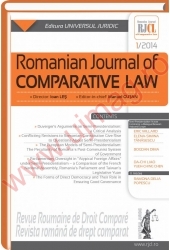Parliamentary Oversight in “Atypical Foreign Affairs” under Semipresidentialism a Comparison of the French National Assembly, Romania’s Parliament and
Parliamentary Oversight in “Atypical Foreign Affairs” under Semipresidentialism a Comparison of the French National Assembly, Romania’s Parliament and
Author(s): Yueh‐Ching Chen, Da-Chi LiaoSubject(s): Law, Constitution, Jurisprudence
Published by: Universul Juridic
Keywords: “Atypical Foreign Affairs”; Historical institutionalism; Parliamentary oversight, semi‐presidentialism, France, Romania, Taiwan
Summary/Abstract: This article explores parliamentary oversight under semi‐presidential systems, and chooses the new phenomena of “atypical foreign affairs” as the object of its examination. It takes countries all of which are semi‐presidential, France, Romania and Taiwan, in its case comparison. The “atypical foreign affairs” refers here to France and Romania’s dealing with EU legislative affairs, as well as Taiwan’s handling of Cross‐Strait affairs. We take the perspective of historical institutionalism in comparing the countries and apply its theoretical elements, such as the historical path, the rational choices of key actors and situations factors (role, time, and precedent), and we divide the stages of parliamentary oversight into “ex‐ante,” “mid‐action,” and “ex‐post” in making deductions and providing logic concerning how institutional design comes about as a result of many situational factors in parliamentary oversight. In addition, this research provides further deductions concerning the oversight results arising from various institutional designs. In summarizing, France was one of the creators of the EU, and has a relatively long period of experience in dealing with its affairs. While it did not initially have precedents to follow, its executive showed strong desire in its proactive advocacy for EU affairs, and its rules allowed parliament to express opinion at the ex‐ante stage in order to lessen the possibility of ex‐post boycotts or backlash. In contrast to France, Romania was a “successor” in the EU, and its parliamentary oversight design had prefabricated norms it could follow: it created an ex‐ante oversight system based on the “Lisbon Treaty” written by France and other early EU members. In addition, the allowing of legislators to also serve as cabinet members in Romania’s “semi‐presidential” system opened up for the Parliament an extra avenue for oversight in the ex‐ante and mid‐action stages. Theoretically and logically, this should lead to fewer waves of opposition in ex‐post scrutiny. With respect to Taiwan and Cross‐Strait relations, it has insufficient experience in handling of Cross‐Strait affairs, and still lacks precedent. Also, its parliamentary oversight design tends to accord with the executive authority’s maximization based on rational self‐interest. As such, the legislature is allowed to participate in ex‐post scrutiny only. This institutional plan ensures there will eventually be a backlash in the legislature.
Journal: Revista Română de Drept Comparat
- Issue Year: 2014
- Issue No: 01
- Page Range: 83-125
- Page Count: 43
- Language: English
- Content File-PDF

